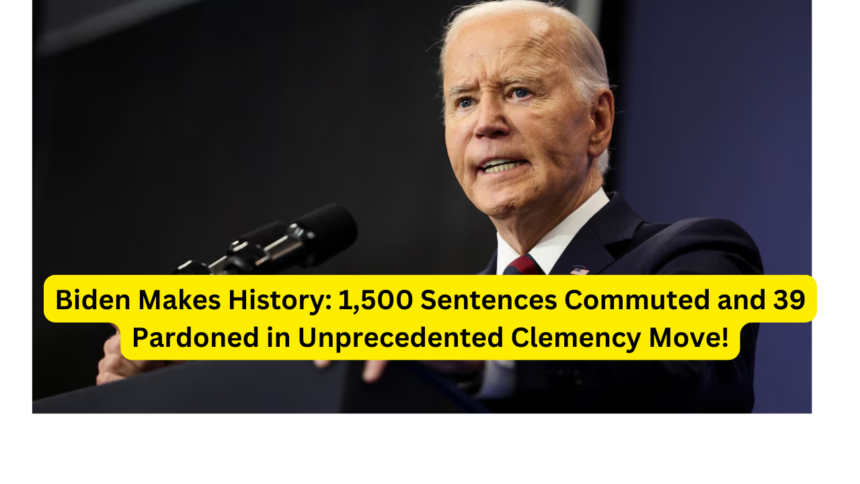“Biden Makes History with Record-Breaking Clemency: 1,500 Sentences Commuted and 39 Pardons Granted in Single-Day Justice Move”
In an unprecedented act of mercy, President Joe Biden has commuted the sentences of approximately 1,500 individuals who had been released from prison and placed on home confinement during the COVID-19 pandemic. In addition, Biden has granted pardons to 39 Americans convicted of nonviolent crimes, marking the largest single-day clemency action in modern U.S. history.
This historic move targets those who had already served at least one year of home confinement, many of whom were originally released to prevent the spread of COVID-19 in overcrowded and unsanitary prison conditions. At the height of the pandemic, prisons became hotbeds for the virus, with reports showing that one in five prisoners contracted COVID-19, which led to a temporary, emergency release of many inmates to reduce the risk of mass infections.
Biden’s decision to grant clemency is part of his ongoing commitment to justice reform, focusing particularly on those convicted of nonviolent offenses. “America was built on the promise of possibility and second chances,” Biden said in a statement. “As president, I have the great privilege of extending mercy to people who have demonstrated remorse and rehabilitation.” His statement also highlighted his administration’s efforts to address sentencing disparities, particularly for individuals convicted of drug offenses.
This sweeping clemency action far exceeds previous acts of mercy in recent U.S. history. The second-largest single-day clemency act was carried out by former President Barack Obama, who commuted the sentences of 330 individuals just before leaving office in 2017. Biden’s 1,500 commutations are a monumental leap forward in the realm of criminal justice reform.
The 39 individuals pardoned on Thursday were convicted of nonviolent crimes, including drug offenses, and had shown significant signs of rehabilitation. Among them are inspiring stories, including a woman who led emergency response teams during natural disasters, a church deacon who has since worked as an addiction counselor and youth mentor, a doctoral student in molecular biosciences, and a decorated military veteran. These pardons reflect Biden’s focus on restoring opportunity and removing unnecessary barriers for individuals who have turned their lives around.
In addition to these commutations and pardons, Biden has previously issued broad clemency, including pardons for those convicted of marijuana possession on federal lands and in the District of Columbia, as well as for former U.S. service members convicted under the now-repealed military ban on consensual same-sex conduct. This latest clemency move comes at a time when the president is facing mounting pressure from criminal justice advocates to act swiftly before his term ends.
Advocacy groups are urging Biden to consider issuing clemency for individuals on federal death row and others who may still be incarcerated due to outdated or unjust laws. Some lawmakers, including Rep. Jim McGovern (D-Mass.) and 34 other congressional leaders, have called for clemency for environmental and human rights lawyer Steven Donziger, who was sentenced to house arrest for contempt of court related to his legal work against Chevron. The push for clemency also extends to individuals who may face retribution if former President Donald Trump resumes office, with advocates calling for preemptive pardons for those involved in investigating Trump’s attempts to overturn the 2020 election results.
The clemency announcements come at a time when Biden is under increased scrutiny, with some critics questioning his actions regarding his son, Hunter Biden, who received a pardon for gun and tax-related crimes. Despite his earlier pledge not to pardon his son, Biden reversed his position, citing the political nature of the prosecution. This decision has sparked debate, with some Americans questioning the timing and fairness of the move, as only about two in 10 Americans approved of his decision, according to a recent poll.
Biden’s commutation and pardon decisions continue to draw both support and opposition. Criminal justice reform advocates view this as a positive step toward correcting past injustices, while others argue that it doesn’t go far enough in addressing broader issues like the death penalty or federal executions. President Biden has expressed his opposition to the death penalty, and while federal executions were paused under Attorney General Merrick Garland, there are concerns that they may resume should a new administration take office.
As Biden’s presidency nears its end, he is weighing additional clemency actions, including the possibility of addressing cases of individuals facing death row sentences or preemptive pardons for those caught up in political investigations. While the president is taking these matters seriously, there is uncertainty about whether these moves will come to fruition in the remaining weeks of his term.
Biden’s clemency actions, however, mark a significant moment in the ongoing conversation about justice reform, second chances, and the role of the president in shaping the nation’s legal landscape. As more pardons and commutations are expected before January 20, 2025, the nation will be watching to see how these moves will shape the future of the U.S. criminal justice system and what impact they will have on the lives of those who are given a second chance.



